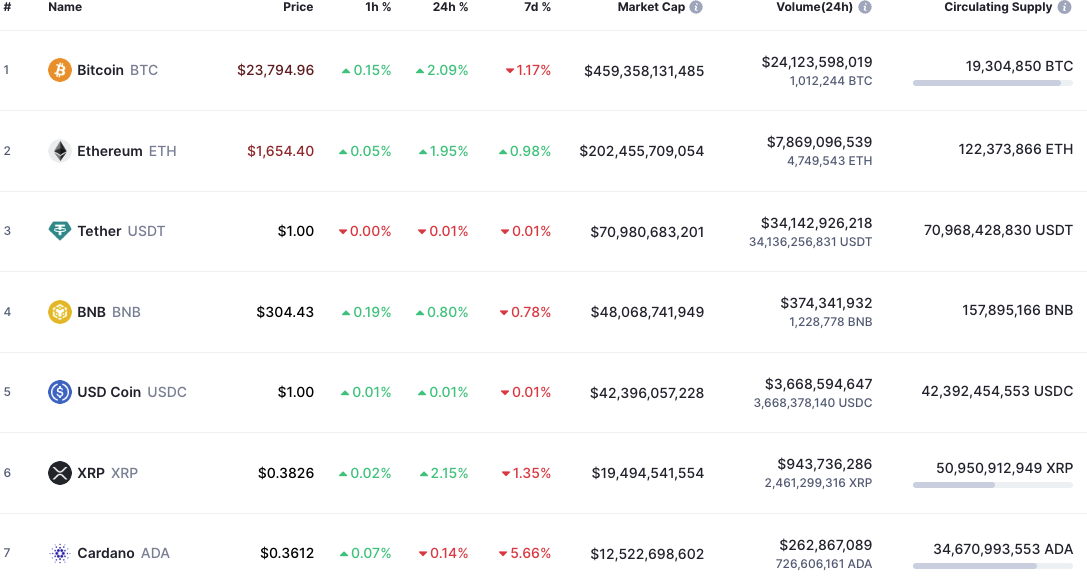Is XRP A Commodity? The SEC's Stance And Ongoing Debate

Table of Contents
The SEC's Argument Against XRP as a Commodity
The SEC's case against Ripple hinges primarily on the application of the Howey Test and allegations of an unregistered securities offering.
The Howey Test and its Application to XRP
The Howey Test is a legal framework used to determine whether an investment contract qualifies as a security. It comprises four criteria: an investment of money, in a common enterprise, with an expectation of profits, primarily from the efforts of others. The SEC argues that XRP satisfies these conditions. They contend that investors purchasing XRP anticipated profits derived from Ripple's efforts to develop and promote the cryptocurrency. The SEC cites Ripple's marketing and distribution strategies as evidence of this expectation.
- Investment of money: The purchase of XRP with fiat currency.
- Common enterprise: The shared fate of XRP investors reliant on Ripple's success.
- Expectation of profits: Anticipation of XRP price appreciation due to Ripple's actions.
- Primarily from the efforts of others: Ripple's development, marketing, and distribution of XRP.
The SEC points to specific instances of Ripple's institutional sales as examples that fit the Howey Test criteria.
Ripple's Alleged Unregistered Securities Offering
Central to the SEC's argument is the claim that Ripple conducted an unregistered securities offering by distributing XRP to institutional investors. The SEC argues that this distribution constituted a sale of securities, violating federal securities laws. They allege that these sales fostered the expectation of profits based on Ripple’s efforts.
- Institutional sales: The SEC alleges that Ripple's sales of XRP to large investors were not exempt from securities laws.
- Programmatic sales: The SEC argues that even sales through exchanges were part of Ripple's unregistered offering.
- Marketing materials: The SEC contends that Ripple's marketing efforts fueled investor expectations of profit.
Arguments for XRP as a Commodity
Conversely, strong arguments exist for classifying XRP as a commodity, emphasizing its decentralized nature, market functionality, and comparability to other cryptocurrencies widely accepted as commodities.
Decentralization and the Role of the XRP Ledger
The XRP Ledger, the underlying technology supporting XRP, operates as a decentralized, open-source network. This decentralized nature distinguishes it from traditional securities, which are typically centralized and issued by a specific entity. The XRP Ledger's governance is not controlled by Ripple, making the argument that investor profits are primarily derived from Ripple's efforts weaker.
- Decentralized consensus: Transactions on the XRP Ledger are validated through a consensus mechanism, not by Ripple.
- Open-source code: The XRP Ledger's source code is publicly available, promoting transparency and community involvement.
- Community governance: While Ripple plays a role, the XRP Ledger is not solely under Ripple's control.
Market Functionality and Usage of XRP
XRP primarily functions as a bridge currency, facilitating fast and low-cost cross-border transactions. Its use in various payment systems and its role in the broader crypto ecosystem strengthen the commodity argument. The demand for XRP is driven by its utility, not solely by Ripple's actions.
- Cross-border payments: XRP enables faster and cheaper international money transfers than traditional banking systems.
- Liquidity provider: XRP enhances liquidity in cryptocurrency exchanges, benefiting traders and investors.
- Payment processing: Several payment platforms utilize XRP for streamlined transactions.
Comparison with Other Cryptocurrencies Deemed Commodities
Many cryptocurrencies, like Bitcoin and Ethereum, are generally considered commodities by various market participants and some regulatory bodies. These cryptocurrencies, like XRP, function primarily as mediums of exchange or store of value, rather than investment contracts generating profits from the efforts of a central entity. Analyzing XRP's characteristics against these established precedents helps strengthen the argument for its commodity classification.
- Bitcoin: Widely accepted as a decentralized digital gold, not a security.
- Ethereum: Often categorized as a commodity, despite its use in decentralized applications.
- Litecoin: Another cryptocurrency frequently classified as a commodity, similar to Bitcoin in its operational structure.
The Ongoing Legal Battle and its Implications
The SEC's lawsuit against Ripple is ongoing, and its outcome will significantly impact XRP's future and the broader cryptocurrency market. A ruling in favor of the SEC could set a precedent for classifying other cryptocurrencies as securities, while a ruling in Ripple's favor could provide clarity and potentially boost XRP's price.
- Potential outcomes: The court could rule in favor of the SEC, Ripple, or reach a partial settlement.
- Impact on XRP: The ruling will significantly affect XRP's price, trading volume, and regulatory status.
- Implications for the crypto market: The outcome could set a precedent for future SEC actions against other cryptocurrency projects.
Conclusion: Understanding the XRP Commodity Debate and its Future
The debate surrounding XRP's classification as a commodity is complex, with compelling arguments on both sides. The SEC's stance, driven by the Howey Test and allegations of an unregistered securities offering, contrasts with arguments emphasizing XRP's decentralized nature, market utility, and similarities to other cryptocurrencies generally accepted as commodities. The ongoing legal battle remains central to resolving this uncertainty. The outcome will significantly impact not only XRP but also the regulatory landscape for the entire cryptocurrency market. Stay updated on the latest developments regarding the XRP commodity debate, continue researching the arguments surrounding XRP's classification, and follow the legal proceedings to better understand the future of XRP.

Featured Posts
-
 Une Boulangerie Normande Gate Le Premier Bebe De L Annee Avec Un Cadeau Chocolate
May 01, 2025
Une Boulangerie Normande Gate Le Premier Bebe De L Annee Avec Un Cadeau Chocolate
May 01, 2025 -
 Popular Indigenous Arts Festival Under Threat Due To Economic Difficulties
May 01, 2025
Popular Indigenous Arts Festival Under Threat Due To Economic Difficulties
May 01, 2025 -
 Priscilla Pointer Dead At 100 Remembering The Actress From Carrie
May 01, 2025
Priscilla Pointer Dead At 100 Remembering The Actress From Carrie
May 01, 2025 -
 Actor Michael Sheens 100 000 Donation Clears 1 Million In Debt
May 01, 2025
Actor Michael Sheens 100 000 Donation Clears 1 Million In Debt
May 01, 2025 -
 Dragons Den Confusion Over Repeat Showing Of Closed Business
May 01, 2025
Dragons Den Confusion Over Repeat Showing Of Closed Business
May 01, 2025
Latest Posts
-
 Local Dallas Star Dies At 100
May 01, 2025
Local Dallas Star Dies At 100
May 01, 2025 -
 Veteran Dallas Star Passes Away Aged 100
May 01, 2025
Veteran Dallas Star Passes Away Aged 100
May 01, 2025 -
 Dallas Stars Passing At Age 100
May 01, 2025
Dallas Stars Passing At Age 100
May 01, 2025 -
 100 Year Old Dallas Star Dead
May 01, 2025
100 Year Old Dallas Star Dead
May 01, 2025 -
 Legendary Dallas Figure Dies At 100
May 01, 2025
Legendary Dallas Figure Dies At 100
May 01, 2025
